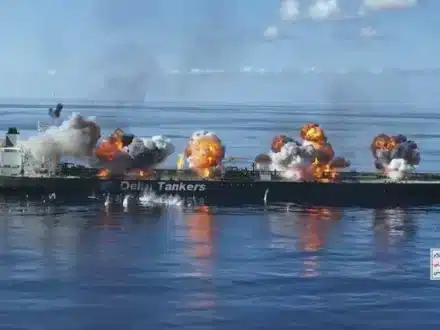On Monday in the Red Sea, two maritime attacks suspected to be conducted by Yemen’s Houthi rebels targeted commercial vessels. This disruption occurred near an ongoing operation to contain a tanker fire that poses a significant environmental threat due to its large crude oil cargo.
The assaults are part of a broader campaign by the Iranian-backed Houthis, affecting the passage of goods valued at approximately $1 trillion annually through the Red Sea. This disruption has implications for the ongoing Israel-Hamas conflict in Gaza and has impacted aid deliveries to Sudan and Yemen.
The first attack on Monday involved two projectiles striking a ship and a third explosion occurring nearby, according to the British military’s United Kingdom Maritime Trade Operations (UKMTO). Fortunately, there were no casualties, and the vessel continued on to its next destination. The attacked ship, identified as the Panama-flagged oil tanker Blue Lagoon I, had been en route from Ust-Luga, Russia, carrying a cargo declared as of Russian origin.
The Blue Lagoon I has a history of voyages to India, a major importer of Russian oil despite the global sanctions against Russia due to its actions in Ukraine.
A second incident reported later on Monday involved an aerial drone striking near another merchant ship off the coast of Hodeida, a Houthi-controlled port city. This attack did not result in any damage or casualties.
The Houthis have not immediately claimed responsibility for these attacks, which is typical of their delayed communication strategy. Since the outbreak of conflict in Gaza in October, the Houthis have targeted over 80 vessels using missiles and drones, leading to the seizure of one ship and the sinking of two, resulting in the deaths of four sailors.
The Houthis assert that their maritime attacks aim to pressure an end to Israel’s military actions in Gaza by targeting vessels associated with Israel, the U.S., or the U.K. However, many of the vessels attacked have little or no direct connection to these conflicts, including some en route to Iran.
On the same day, efforts were made to salvage the Sounion oil tanker, previously attacked by the Houthis and abandoned. Despite announcements that tug boats would tow the tanker, ongoing satellite imagery indicated that the tanker was still ablaze.
Previously, the Houthis had captured the Sounion, carrying approximately 1 million barrels of oil, and attacked it using small arms, projectiles, and a drone boat. A European Union naval mission subsequently rescued the abandoned crew, comprising 25 Filipinos and Russians, along with four private security staff, bringing them safely to Djibouti.


